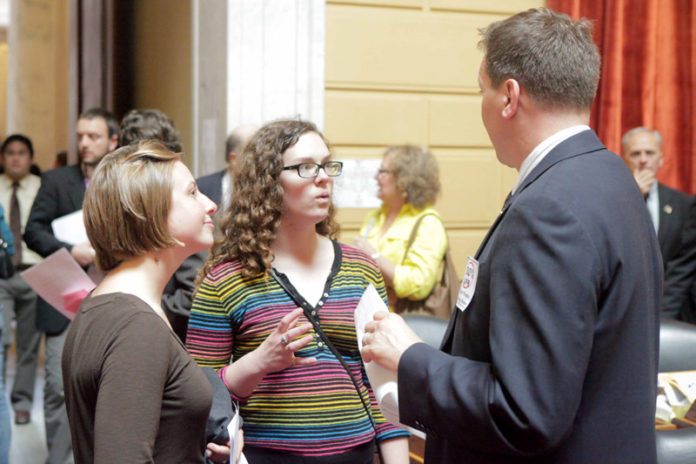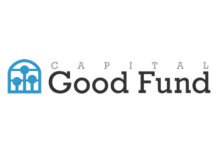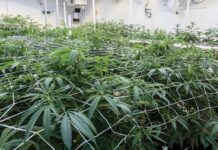
Ask around at the next group gathering you happen to attend and you’ll likely find that most everyone will agree the state’s waterways are deserving of protection from pollution and their surrounding wildlife should be saved from hazardous plastic.
Then ask them for a few dollars to help aid the cause.
You may not get quite the same response.
“That’s transactional – and political fundraising mostly is,” said Doris R. Feinberg, president of The Prospero Group LLC, a Providence business that specializes in counseling nonprofits on fundraising issues. “The most meaningful, and the deepest and most sustained philanthropy happens when you have a relationship with a donor.”
And when it is done right that means canvassing, the somewhat old-fashioned, grassroots practice of sending organizational representatives door-to-door in efforts to garner money and support for various causes.
On Providence’s East Side, Environment Rhode Island was recently canvassing for support of its campaign to make Narragansett Bay a plastic-free zone during its 2012 summer canvass.
The ultimate goal is to get Rhode Island lawmakers, during their next legislative session, to pass a bill banning plastic bags at point-of-sale purchase stations.
“Plastic doesn’t biodegrade. It makes its way to the marine environment and threatens to remain there for hundreds of years and poses a direct threat to wildlife,” said Channing Jones, an Environment Rhode Island program associate who is directing the summer canvass. “In the Northeast, there hasn’t been a lot of movement on [banning plastic bags]. It is something that’s moving on a state level [on the West Coast].”
Environment Rhode Island is a branch of the national organization Environment America founded in 2007 and based in Boston and Washington, D.C. Since then the organization – at a national and local level – has relied heavily on canvassing to build funding sources and awareness, though it also solicits donations through an online campaign, mass mailings, a major donor program and from private foundations.
It does not accept government or corporate funding.
Jamie Rhodes is the Rhode Island director of Clean Water Action, a national nonprofit that works to promote clean, safe and affordable water among other issues, organizes grassroots groups, coalitions, and campaigns to elect environmental candidates. He said canvassing provided a substantial boost to its efforts to garner support for the 2010 Diesel Emissions Reduction Act that, among other things, limits heavy-duty vehicles’ idling time to five minutes.
Canvassing for the group also has involved soliciting donations. They’ve recently targeted Cranston, North Kingstown and Pawtucket.
“I think the best answer of why it’s successful is that we’re able to bring our issues directly to the people they affect. [Our] office has been [canvassing] since 1990. I would classify that as a success,” Rhodes said. “Political action is more than just signing your name. When you’re willing to put a couple of dollars behind that, it shows a long-term investment to the outcome.”
Rhodes said group canvassing has proven “successful and unsuccessful” but he measures the nonsuccesses in terms of unresolved issues, including clarification of the Clean Water Act, a 1972 amendment to the Federal Water Pollution Control Act, to include all United States waterways.
Save The Bay, a nonprofit that works to protect, restore and improve the ecological health of the Narragansett Bay region, according to its website, and based in Providence, stays completely away from door-to-door campaigning and fundraising.
Rosamaria Amoros, director of marketing and communications, said the organization has takes the stance that it would not yield positive results.
The group also wants to be recognized as separate from Clean Water Action.
Feinberg said one reason canvassing can be unsuccessful is that it isn’t always effective in establishing donor relationships, which she says is crucial to lasting commitments, financial and otherwise.
Visiting homes to introduce an organization and its mission, she said, is a good starting point but there has to be relationship-building follow up.
“[If] it’s about going in and talking about the impact of the organization [and] you leave material and [invite] them to a program, I think it’s super-effective,” Feinberg said. “[Some religious groups] go door to door and don’t ask for money at all. They get in the door and my guess is that they’re ultimately successful because they engage someone in the emotional connection.”
Environment Rhode Island’s field canvassing is staffed through the Fund for the Public Interest, a Washington, D.C. – based nonprofit referred to as The Fund. The latter has run public fundraising and canvassing for several political nonprofits since the 1980s, including the Human Rights Campaign, the Washington, D.C., organization that advocates for gay, lesbian, bisexual and transgender civil rights.
Regular canvassers with The Fund are advertised to make between $400 and $600 per week. Field managers, whose duties could include logistical organizing, would earn between $50 to $100 extra.
Clean Water Action advertises for canvassing jobs and conducts a two-part interview to ensure there is genuine interest. Field canvassers earn between $9.25 and $11.25 per hour and can work part or full time.
“It’s obviously not for everybody,” Rhodes said.
At both organizations there is heavy-duty safety training. Many canvasses are conducted during evening hours when residents typically are home.
“In my 12 years [canvassing], I’ve [seen someone] bitten by a dog, but I’ve never heard anything [worse],” Neumann said. “I think that if canvassers approach in a friendly and professional manner, [people will respond] in a friendly and professional manner.” •












